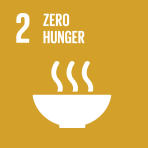 Zero Hunger
Zero Hunger
Foreword
In recent years, there has been a paradigm shift in how trade is understood, regulated, and practiced. Instead of being primarily a means of spurring economic growth or advancing political relations, trade has also proven its potential as a powerful tool for tackling environmental and social ills. Achieving those goals, however, is not clear-cut, and finding the right policy prescription so that these efforts do not inadvertently cause harm requires data, consultations and coordination with supply and value chain actors, and a clear understanding of which practices work best, and where.
Acknowledgements
The Research Institute of Organic Agriculture (FiBL), the International Institute for Sustainable Development (IISD), and the International Trade Centre are deeply grateful to the Swiss State Secretariat for Economic Affairs for its financial support of the global data collection on voluntary sustainability standards and the production of this publication.
The State of Sustainable Markets 2025
Statistics and Emerging Trends
This 10th global report provides new insights into the evolution of certified agriculture and forestry. The International Trade Centre has teamed up once again with the Research Institute of Organic Agriculture and the International Institute for Sustainable Development to provide data on 13 major sustainability standards for bananas, cocoa, coffee, cotton, oil palm, soybeans, sugarcane, tea, and forestry products. This year’s report adds data from 2023 and finds that growth continued after an unusual dip in 2020. The publication helps shape decisions of policymakers, producers, and businesses, working to address systemic labour and environmental challenges through certified sustainable production.
Project partners
The International Trade Centre, founded in 1964, is the joint agency of the World Trade Organization and the United Nations. Its aim is for businesses in developing countries to become more competitive in global markets, to speed up economic development, and to contribute to the achievement of the United Nations Sustainable Development Goals.
Selected commodities grew again in 2023
This chapter examines the harvested area and the production volume of the selected commodities on an aggregate level. As multiple certification remains an issue for some commodities, global totals were computed by adding the country minimums4 (leading to a global minimum value for each commodity), the country maximums5 (leading to a global maximum value for each commodity), and the country minimum–maximum averages6 (leading to a global average value for each commodity).
Executive summary
The concept of a ‘sustainability standard’ has evolved from a mere buzzword into a crucial pillar of global trade. Sustainability standards are important in international trade due to their role in promoting ethical business conduct, preparing businesses for upcoming mandatory regulations, fostering harmonization in global trade, and driving innovation. As the world continues to prioritize sustainability, these standards serve as a potential framework upon which a more environmentally conscious and socially responsible global economy can be built.
Development of the selected standards
This chapter examines the selected sustainability standards on an aggregate level, considering the full range of commodities each standard certified (and not only the selected nine commodities covered in this report). For this purpose, this chapter focuses on variables for which an aggregation across commodities is meaningful – namely, a standard’s certified area and its producers/certificate holders.
Executive Summary
Sudan faces one of the world’s most severe food-in-security crises, with women and girls experiencing the greatest impacts.
Gender Alert: ‘Last and Least’ - Gender Dimensions of Food Insecurity in Sudan
This gender alert analyses how food insecurity and conflict in Sudan are deepening gender inequalities. The report draws on field testimonies, rapid gender analysis, and data from humanitarian partners to highlight how women and girls are disproportionately affected by one of the world’s worst food crises. Female-headed households are three times more likely than male-headed ones to face extreme hunger, and 74 per cent of girls are out of school. The collapse of livelihoods, markets, and health systems has exposed women and girls to intersecting risks of malnutrition, displacement, and gender-based violence (GBV). Despite these conditions, women-led organizations are delivering frontline relief operating community kitchens, safe spaces, and health services, yet they receive less than three per cent of humanitarian funding. This publication calls for urgent, gender-responsive action, prioritizing women and girls in aid delivery, resourcing women-led organizations, scaling up protection and GBV prevention, and integrating gender equality across humanitarian and recovery efforts to save lives and restore dignity.
Introduction
This analysis triangulates women’s testimonies and key-informant interviews with secondary literature on gender and food security in Sudan.
Introduction
Haïti est confronté à une crise humanitaire dévastatrice, qui évolue rapidement.
Répercussions sur la santé et la nutrition des enfants
Plus de 1 million d’enfants sont en situation d’insécurité alimentaire sérieuse (phase 3 ou plus de l’IPC).
